ECONOMIC PERSPECTIVES OF UNIVERSITY STUDENTS
IN THE SOUTH EAST ANATOLIA REGION
WITH REGARD TO EU
MEMBERSHIP OF TURKEY
CONTENTS
Abstract/Özet
1. Introduction
2. Literature Review
3. Data and Method
4. Analysis of the Surveys
Data
4.1.
Information on the Participants
4.2.
General Information on the EU
4.3.
Assessments for Turkeys Economy in case of Its Membership to the EU
4.3.1. Assessments on Consumer
Perceptions
4.3.2. Sectoral Assessments
4.3.3. Micro Economic
Assessment
4.3.4. Macro Economic
Assessment
5. Conclusion
References
Enclosure:
Qnaire Form
Abstract
This paper aims to reveal the economic perspectives of university students in the South East
Anatolia Region of Turkey (SAR). In this context, data obtained through a
survey conducted with university students in nine cities of the region (Mardin,
Adıyaman, Antep, Batman, Diyarbakır, Kilis, Siirt, Şırnak, and Urfa) during April-June 2016 is analysed.
Most participants are knowledgeable
about the EU and more than the half support membership for Turkey. However,
while they perceive the Union as having a brilliant future, 39% believe that
Turkey will never become an EU member. The percentage
of those who think that EU membership would lead to an increase in the quality
of goods/services is 58%. A significant percentage of participants expect
positive outcomes in product quality for the food, farming, and fishing
sectors; technological progress and innovative capability for industrial
sector; and international competition for the service sector.
57% of participants look
forward to an improvement in the institutionalism of companies. Half the
participants expect positive changes in wages and salaries. Conversely, the
proportion of those who expect to see negative effects of companies on the
environment is 43%. While half the participants believe that unemployment in
Keywords: South
JEL
Classification: F6, O19, O52.
GÜNEYDOĞU ANADOLU BÖLGESİNDE ÜNİVERSİTE
ÖĞRENCİLERİNİN
AVRUPA BİRLİĞİNE İKTİSADÎ BAKIŞ AÇISI
Özet
Bu çalışma, Güneydoğu Anadolu
Bölgesindeki üniversite öğrencilerinin Avrupa Birliğine (AB) iktisadî bakış
açısını ortaya koymayı hedeflemekte olup bu amaçla düzenlenen anket verilerinin
analizini içermektedir. Bu çerçevede, katılımcıların ABye ilişkin genel
bilgileri ve ABye üyelik sonrasında Türkiye iktisadına ilişkin
değerlendirmeleri araştırılmıştır.
Katılımcıların önemli bir kısmı AB
hakkında bilgi sahibi olup yarıdan fazlası Türkiyenin AB üyeliğini
desteklemektedir. Fakat %39u Türkiyenin hiçbir zaman ABye üye olamayacağı
kanaatini taşımaktadır. Bununla beraber, yarısından biraz fazlası Birliğin
iktisadî geleceğini parlak görmektedir. Birliğe
üyeliğin malların/hizmetlerin kalitesinde artışa yol açacağını düşünenlerin
oranı %58dir. Katılımcıların önemli bir kısmı tarım, hayvancılık ve
balıkçılık sektörlerinde ürün kalitesi, sanayi sektöründe teknolojik gelişme
ve inovasyon kaabiliyeti ve hizmet sektöründe uluslararası rekabet
açılarından olumlu gelişmeler beklediğini ifade etmiştir.
Firmaların kurumsallaşma seviyelerinde iyileşme
bekleyenlerin oranı %57dir. Katılımcıların yarısı da çalışanların ücretlerinde
olumlu değişim beklediğini ifade etmiştir. Öte yandan, Birliğe katıldıktan
sonra işletmelerin çevreye olumsuz etkilerinde azalma bekleyenlerin oranı
%43tür. Katılımcıların yarısı Türkiyede işsizliğin
azalacağını belirtirken, enflasyonun düşeceği yönünde tercihte bulunanların
oranı ise %35tir. Gelir dağılımında adaletin sağlanacağına inananların oranı
da benzer seviyededir.
Anahtar
Kelimeler: Güneydoğu Anadolu Bölgesi, Üniversite
Öğrencileri, Avrupa Birliği (AB), ABye İktisadî Bakış, AB-Türkiye İlişkileri.
JEL
Sınıflandırması: F6, O19, O52.
1. Introduction
The European Union (EU) to which Turkey has, for
a long time, endeavoured to become a member, is an institutional structure that
is discussed in Turkey in terms of its political, social, and economic aspects.
However, economic issues are mainly taken into account. Prioritisation of the
economic aspects of the EU by people during negotiations, or forming their
expectations, is understandable in a country which lies far behind the Union in
terms of average income level and standard of living.
Conversely, the issue of EU membership, particularly in the South East Anatolia Region of Turkey,
is usually associated with political issues; the economic perspectives for its
population with regard to the EU and its membership, are not necessarily being
taken into account. Yet, the economic possibilities that would be provided by
the EU are highly significant for the peope of the South East Anatolia Region.
In general, although economic issues and related
expectations are prioritised, studies on Turkeys people, particularly on their
economic perspectives with regard to the EU, are insufficient. This study aims to close that gap, with particular stress
on the opinions of the population in the South East Anatolia Region of Turkey,
revealing their economic perspectives with regard to the EU. In this case,
university students being indentified as a target group. The basis of the study
is formed by a survey conducted with the university students of nine cities in
South East Anatolia Region (Mardin, Adıyaman,
Antep, Batman, Diyarbakır, Kilis, Siirt, Şırnak, Urfa) during April-June 2016.
This paper aims, on the one hand, to determine
the main understanding and interest level of students with regard to the EU
and, on the other, to study the effects of possible EU membership of Turkey on
consumer perceptions, sectors, and micro-macro economic life. The analyses
made through this field study are designed to be helpful for both the policy
implementation of Turkeys membership of the EU and to determine the position
of the South East Anatolia Region of Turkey in
this process.
In this context, the targets of the paper are
the following: determination of economic perceptions of university students in
the region on the EU and outcomes of possible EU membership of Turkey, making
some political inferences based on the data obtained, and making some proposals
for training or raising awareness of people on the subject.
2. Literature Review
Academic studies aimed at revealing and analysing
the opinions of individuals with regard to the EU have been undertaken, mostly
in the 1990s. Regional public polls have also been made, mostly in the 2000s;
these were based on orientation theories rather than being for or against EU
membership in the South East Anatolia Region of Turkey (Samur and Ekinci, 2018,
220). It should also be stated that in international literature there is an
insufficiency of orientation based theories that study and analyse this subject
in detail. Moreover, papers that study the economic aspects of the issues for
the region are scarce.
Economic literature on Turkeys EU membership
concentrates mainly on three areas: the general effects of EU membership on
Turkeys economy, the general effects of a Customs Union on Turkeys economy
and the sectoral effects of the Customs Union and EU membership.
An example of the first group is the study by
Karakaya and Özgen (2002) which analyses the trade formation and diversion
effects of Turkeys EU membership. An example of the second group is the study
by Akkoyunlu-Wigley, Mıhçı, and Arslan (2006). Here, they examine the effects
of a Customs Union on the growth of Turkeys economy.
The paper by Bekmez (2002) falls into the last
group. Bekmez studies the sectoral effects of EU membership on Turkeys
economy. While the paper by Filiztekin (2003) analyses the effects of the
Customs Union on Turkeys manufacturing sector, the paper by Akbostancı, Tunç
and Türüt-Aşık (2006) is a study of the environmental effects of the Customs
Union on Turkeys economy; and the study by Ekinci (2006) is an analysis of the
position of businesses in Turkey within EU membership. These are all also
within the framework of the third group.
There are also various public opinion polls
examining Turkeys membership of the EU. The researches of Ceran et al. (2016)
and Özsöz et al. (2015) analysing support level and perception of Turkeys
public opinion and its level of the support with regard to EU membership; the
survey by Ercan (2016) examining Turkeys public opinion towards the EU; the
questionnaire by Samur and Oral (2007) determining the
orientation of university seniors in Diyarbakır to the EU; the poll by Yazgan and Aktaş (2012) examining the role played by
public opinion in the city of Çankırı with regard to relations between Turkey
and the EU; and the survey of Karakuzu et al. (2015) studying the perception of Vocational Higher School students to the EU in the province
of Uzunköprü-Edirne, could all be classified as being within the scope of this
study.
As mentioned above, such studies do not, focus
specifically on the economic aspect of the issue but are about the effects of
membership on a sector and/or the perception of people of a city/province.
Moreover, although existence of such studies is known, no published paper
focusing mainly on the economic perspectives of public opinion in the South
East Anatolia Region has been found so far. Therefore, it can be said that this
paper shall make a contribution to close this gap.
3. Data and Method
The main theme of the paper includes general
opinions on the EU of students in the region and effects of possible EU membership
of Turkey on consumer perceptions, sectors, and micro-macro economic life.
Through the survey conducted in the cities of Mardin,
Adıyaman, Antep, Batman, Diyarbakır, Kilis, Siirt, Şırnak, and Urfa,
answers of the mentioned students were sought for the following questions:
·
Are they knowledgeable about the
economic advantages of the EU?
·
What will happen in the
agriculture, industry, and service sectors following EU membership of Turkey?
·
What kinds of changes will occur
in working conditions, institutionalisation of companies, competition, and the
environment?
·
How will unemployment, inflation,
and income distribution change in the case of membership?
As it is
handling an actual but a rare issue in the literature, the paper has an
original value. The analyses made through this field study are expected to be
helpful for both the policy implementation of Turkeys membership of the EU and
the determination of the position of the South East
Anatolia Region of Turkey in this process.
The paper includes a dual
research method: firstly it is a desk study consisting of a literature review,
preparation of a questionnaire, and analysis of the surveys data. Secondly
there is a field study. In this context, a survey of 266 people was conducted
using the methods of face-to-face interview with regularly selected persons, by
visiting the said cities by filling in an online form, and via mail/e-mail
communication.
The
field study includes 26 questions classified under three main headings:
personal information on the participants, their general knowledge and opinions
on the EU plus their economic perspectives with regard to EU membership of
Turkey. A 5-Point Likert Scale Method is applied in the
survey. Here, when analysing and
assessing the survey clustered cylinder and separated cake graphs are used
for the presentation of the answers.
4. Analysis of the Surveys Data
4.1. Information on the Participants
The
participants are mainly from the Faculty of Economics and Administrative
Sciences (FEAS). However, to enrich the research, students of the Faculties of
Theology, Engineering, Architecture, and Vocational Higher Schools are also
included.
The
share of FEAS students is 87% of the total. They are from the departments of
Economics, Business, Political Sciences and Public Management, and
International Relations. Information on the gender and age range of the
participants is given below.
Q1)
Gender of the participants
|
Male |
57% |
|
Female |
43% |
Although
the majority of the participants are male, the number of females is not much
lower. Thus, one can say that the representation level of the research is high
in terms of gender.
Q2)
Age range of the participants
As
they are university students, the age of the participants ranges from 17 to 28
years.
4.2. General Information on the EU
In
this section of the survey, the main knowledge levels of the participants,
their positive-negative approaches, and their assessments on the EU membership
process of Turkey are revealed and related analyses are made.
Q3)
Do you support Turkeys membership of the EU?
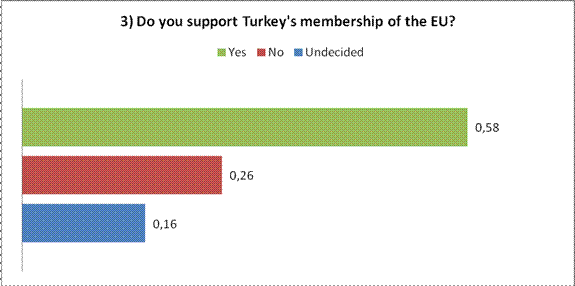
While more than half the
participants supported Turkeys membership of the EU, the crisis of confidence
with regard to several issues between Turkey and the EU, turned positive
opinions to negative to a certain extent.
Q4)
How much information do you have about the EU?

An
important percentage of the participants have knowledge of the EU. However, the
largest share (75%) belongs to participants who say some.
Q5)
What are your reasons for supporting EU membership of Turkey?
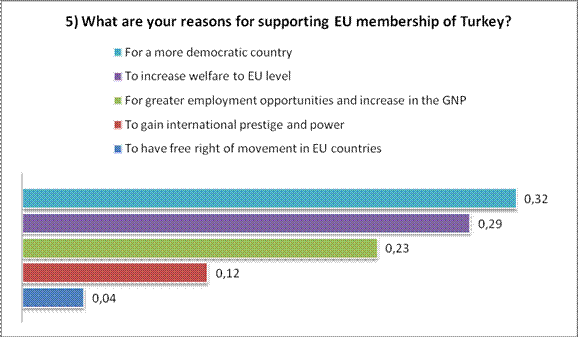
The
main reasons stated for support of EU membership are political and social rather
than economic. This can be summarised as more democracy. Economic reasons
are then preferred. Among them the first is To increase welfare to EU level.
Q6) What
are your reasons for not supporting EU membership of Turkey?
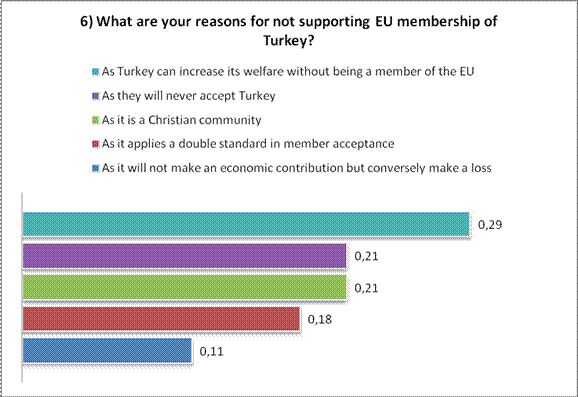
The main reason stated for not supporting EU
membership is the belief that
Q7) In which case would your negative opinion of the
EU change?

Half the participants think that the EU is prejudiced
against
Q8) How long will
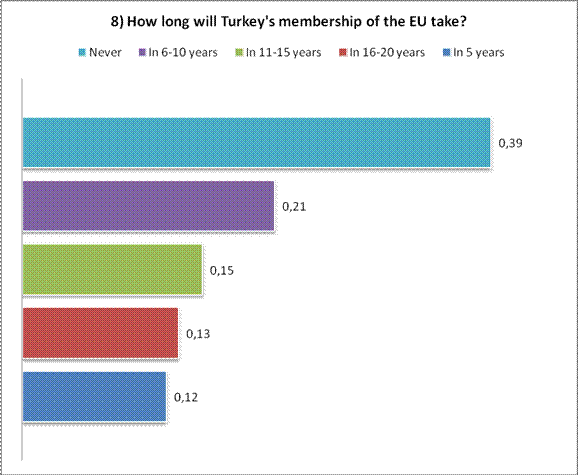
39% of the participants believe that
Q9) How do you assess the economic future of the EU?
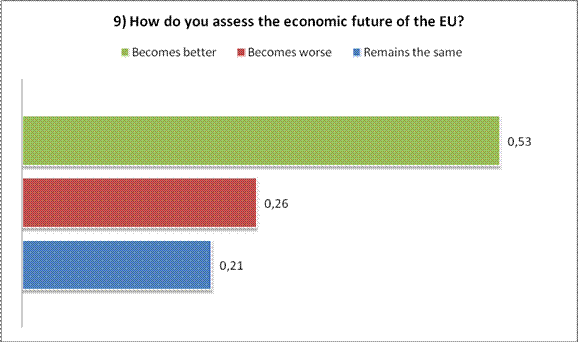
In spite of some economic and political conflicts in
the EU countries, more than half the participants (53%) expect a brilliant
future for the
Q10) Have you ever benefited from a grant and/or
encouragement programmes of the EU?

61% of the participants have never benefited from a
grant and/or encouragement programmes of the EU. Moreover, 32% of the total
have no information on such matters.
4.3. Assessments for Turkeys Economy in case of
Its Membership to the EU
In
this section, the economic perspectives of the participants with regard to EU membership
of Turkey are studied in detail. In this context, their assessments on the effects of possible EU membership of Turkey on consumer perceptions,
sectors, and micro-macro economic life are determined. Here, a
5-Point Likert Scale Method is applied in determining the preferences.
4.3.1. Assessments on Consumer Perceptions
Q11) Use of the
Euro as a common monetary unit will facilitate life.

The belief level of the participants on Use
of the Euro as a common monetary unit facilitates life is low. Those who think
positively on this matter are at the rate of 32%. It can be said that the
reason for such a low rate is the economic crisis that occurs in some European
countries, particularly in
Q12) New commercial
regulations will facilitate life.

The percentage of those who
think that the new commercial regulations through EU membership will facilitate
life is 70%; a high rate.
Q13) Quality of goods/services
will increase and their prices become reasonable.
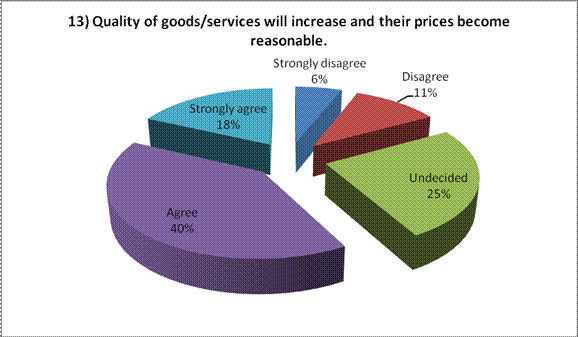
The proportion of participants
who think that the quality of goods/services will increase and their prices
become reasonable through EU membership is 58%.
Q14) Consumer rights will
operate correctly.
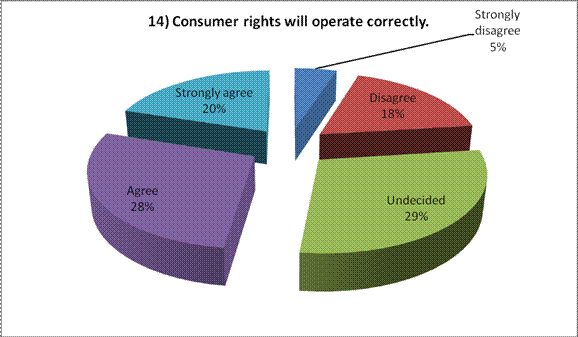
The belief level of the
participants who think that consumer rights operate correctly through the EU
membership is below half. Here, the preference of indecisive participants is
remarkable with the rate of 29%.
4.3.2.
Sectoral Assessments
Q15) New markets
will appear.
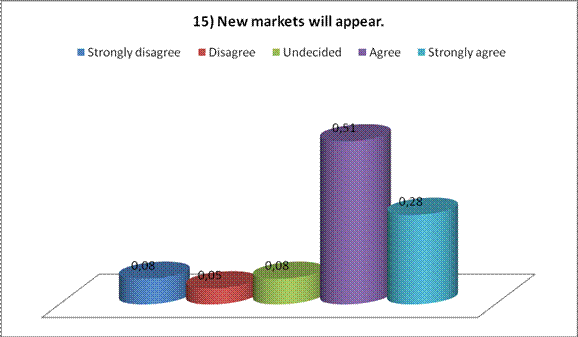
The participants have positive expectations with
regard to new markets. The rate of those who believe that new markets will appear with EU membership is 79%.
Q16) Product quality will
increase in agriculture, farming, and fishing sectors.
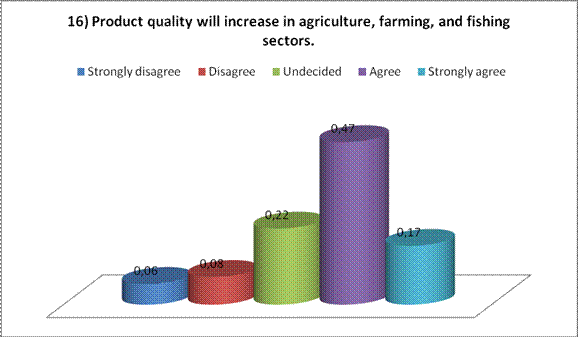
Opinions on the sub-sectoral
economic development are positive. In this context, for instance, 64% of the
total expect product quality increases in agriculture, farming, and fishing
sectors with EU membership.
Q17) Technological progress
and innovative capability will occur in industry.

76% of participants think that
with Turkeys EU membership, technological progress and innovative capability
will occur in industry.
Q18) International competition
will increase in service sector.
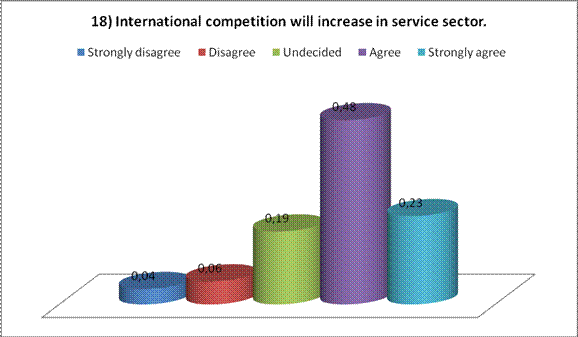
As in the other sectoral
assessments, participants believe that with Turkeys EU membership
international competition in the service sector will increase. The percentage
of those who agree is 71%
4.3.3. Micro Economic Assessment
Q19)
Wages/salaries will rise.

Nearly half the participants
(47%) think that EU membership will have a positive effect on wages/salaries.
However, the choice of those as yet undecided is remarkable. At 34% it comes
top among all the answers.
Q20) Companies will be
institutionalised.

While the participants who
expect an improvement in the institutionalisation level of companies is 57%,
the rate of those who differ is 14%.
Q21) Negative effects of
companies on the environment will decrease.

Following EU membership, the
proportion of those who expect a decrease in the negative effects of companies
on the environment is 43%. The proportion of those who think differently
remains at 27%. However, the proportion of undecided students is 30%.
Q22)
Government regulations on competition will be increased.
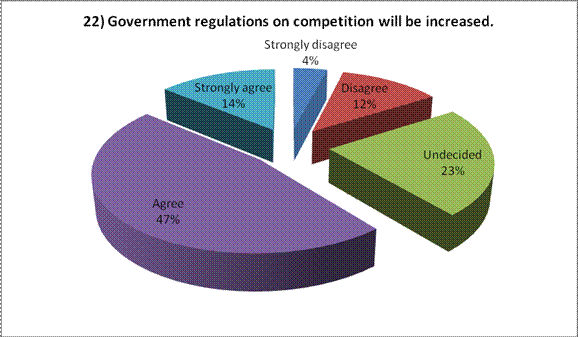
An important proportion of
participants believe that government regulations on competition will be
increased (61%). Only 16% disagree.
4.3.4. Macro Economic Assessment
Q23) Unemployment rate will
decrease.

Nearly half the students think
that the unemployment rate will fall (49%). However, it seems that there is no
clarity on this matter as 29% of the participants are undecided.
Q24) Inflation rate will
decrease.

Those who believe that the
rate of inflation will decrease following EU membership stands at 35% which is
clearly a low rate. Moreover, the share of the undecided students is greater
(39%).
Q25) Inequality in
income distribution will be reduced.
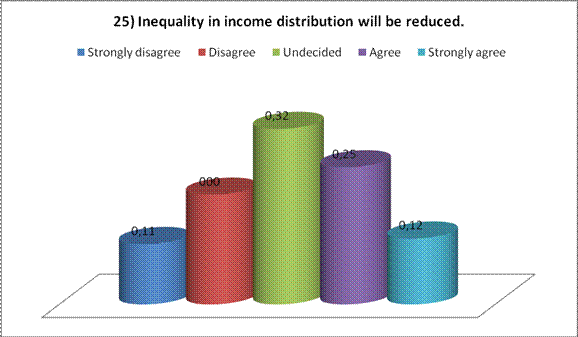
Like the preferences of the
participants for inflation, those who believe that inequality
in income distribution will be reduced following
Turkeys EU membership is low (37%). The share of those against this idea is
31% while the proportion of undecided students is 32%.
Q26) Income per capita will
increase.

53% of participants think that
income per capita will increase following EU membership of Turkey, while 22%
believe that it will not be so.
5. Conclusion
Turkey has endeavoured to become a member of the
EU for a long time. This is discussed in Turkey in terms of several aspects;
namely political, social, and economic. The economic aspects of the EU are
either prioritised by the people during such negotiations or contribute to
forming their expectations. Prioritisation of the economic possibilities of the
EU is understandable, as Turkey is very behind the Union in terms of average
income level and standard of living. However, although economic issues and
related expectations are in general so prioritised, studies on the EU,
particularly on the economic perspectives of Turkeys people, especially those
in the South East Anatolia Region, are
insufficient.
Based on a survey, this paper seeks to understand
the various economic perspectives on EU membership of Turkey by the
participants namely, 266 students from the Faculty of Economics and
Administrative Sciences (FEAS), and Faculties of Theology, Engineering,
Architecture, and Vocational Higher Schools of the nine universities of the
South East Anatolia Region. Related analyses and assessments were then made.
The main parameters obtained and analysed from this
field study are as follows: supporting/not supporting
Most
participants have knowledge of the EU and more than half support EU membership
of Turkey. The main reason for this support is political and social more
than economic which can be inferred as more democracy. Economic reasons
come later.
Based on the belief that
Nearly half the participants are pessimistic with
regard to
More than half the participants have never benefited
from an EU grant and/or incitement programmes. Worse, 1/3 of the total have no
information on such financial possibilities. These answers give some clues to
the thought processes of those people prioritising
the economic aspects of the EU during their negotiations or forming their
expectations. Clearly this approach is unbalanced. Those people who have
economic expectations from the EU should also be made aware of its other
benefits. In this context, not benefiting from the incitement and financial
support of the EU can be understood. It is, however, hard to understand why
they are having no knowledge of such programmes. This acknowledgement can be
construed as the participants being very unclear about what they can expect
from Turkeys EU membership.
In the section on the economic
perspectives of participants with regard to EU membership of Turkey, consumer perceptions, sectors, and micro-macro economic life are
searched for. In this context, those who think that use
of the Euro as a common monetary unit facilitates life has a low rating. Only
1/3 of participants believe the reverse. The reason for such a low rate can be
stated as being due to the economic crisis happening in some Euro area
countries, particularly in
The first issue under sectoral assessments is the
participants expectations of the new markets. 79% of them believe that new
markets will appear with EU
membership. Secondly, 64% of the total expect product quality increases in
agriculture, farming, and fishing sectors. Thirdly, 3/4 of the participants
think that technological progress and innovative capability will occur in
industry. Lastly, the proportion of participants who believe that international
competition will increase in the service sector is 71%.
In the context of micro economic assessments;
60% of participants believe that following Turkeys
EU membership, government regulations on competition will increase. The
proportion of participants who expect an improvement in the
institutionalisation level of companies is similar to that above. Nearly half
the students think that EU membership will have positive effects on
wages/salaries. Their expectations with regard to the decrease of negative
effects of companies on the environment is also positive. In fact, following EU
membership, the proportion of participants who believe that such negative
effects in Turkey will be lower is 43%.
In the context of macro economic assessments; nearly half the students think that the unemployment rate
will be lower (49%). However, those who believe that the rate of inflation will
decrease following EU membership is only 35%. The proportion of students who
believe that inequality in income distribution will be
reduced is almost the same as that
given above. On the other hand, the participants who expect an increase in
income per capita in Turkey following EU membership is more than half.
During the analyses, it was observed that while
the preferences of participants in micro economic subjects are more prominent, this
is not so with regard to macro economic issues. While preferences are generally
positive with regard to micro economic life, the same does not apply to macro
economic life. Thus, it is seen that there is no uniformity among the students
choices in terms of unemployment, inflation, income distribution, and income
per capita.
For example, the participants show clear
indecisiveness when stating their preferences with regard to the decrease of
inflation and the reduction of inequality in income distribution. The proportional decrease in the number of those who are for lowering
the inflation is also shown in the preferences for
reducing the inequality in income distribution. However, they do behave in the same manner for the decrease in
unemployment and increase in income per capita.
It should be stated that while the participants expect
an increase in income per capita following
Although this paper includes a field study made during
the period April-June 2016, one can say that it continues to have relevance as
it reveals the perspectives of university students in the South East Anatolia
Region of Turkey. However, a similar field study is planned for the near future
using comparative static analysis so that it shall be possible to make
detailed analyses and assesments.
* Assoc. Prof. Dr. Mehmet Behzat
Ekinci
Economics, FEAS,
** Assoc.
Prof. Dr. Mehmet Kara
Economics,
FEAS,
*** Economic Perspectives of University
Students in the South East Anatolia Region with Regard to EU Membership of
References
Akbostancı, Elif; G. İpek Tunç; Serap Türüt-Aşık (2006). Environmental
Impact of Customs Union Agreement with EU on
Akkoyunlu-Wigley Arzu; Sevinç Mıhçı; Hakan Arslan
(2006). The Custom Union with EU and Its Impact on
Bekmez, Selahattin (2002). Sectoral Impacts of
Turkish Accession to the European Union, Eastern Economic Journal,
40(2), 57-84.
Ceran, Ahmet; Çisel İleri; İlge Kıvılcım; Yeliz Şahin
(2016). Türkiye Kamuoyunda AB Desteği ve Avrupa Algısı; Kamuoyu Araştırması,
İktisadi Kalkınma Vakfı, Yayın No: 213, İstanbul.
Ekinci, Mehmet Behzat (2006). AB Üyeliği Sürecinde
Türkiye İşletmeleri; Sorunlar ve Fırsatlar, Avrupa Yolunda
Türkiye; Müzakere Sürecinin Ekonomi Politiği, Mehmet Dikkaya (ed.),
Alfa Aktüel Yayıncılık, Bursa, 187-223.
Ercan, Murat (2012). Bilecik Üniversitesi Avrupa
Birliği Anketi; Türkiye Kamuoyu ABye Nasıl Bakıyor?, Cumhuriyet Üniversitesi, Edebiyat Fakültesi, Sosyal Bilimler Dergisi,
36(1), 199-220, http://dergi.cumhuriyet.edu.tr/cumusosbil/article/view/1008000924/1008001380.
Filiztekin, Alpay; (2003). Avrupa Birliği ile Gümrük
Birliğinin Türkiye İmalat Sanayi Üzerindeki Etkileri, Kalder 12.Ulusal
Kalite Kongresi, İstanbul, 14 Ekim.
Karakaya, Etem; Ferhat B. Özgen (2002). Economic
Feasibility of Turkeys Economic Integration with the EU: Perspectives from
Trade Creation and Trade Diversion, International
Economics Research Conference, September 11-14, https://ssrn.com/abstract=1014031.
Karakuzu, Taner; Seyfi Aktoprak; Çiğdem Erk; İlker
Limon (2015). Meslek Yüksekokulu Öğrencilerinde Avrupa Birliği Algısı Üzerine
Karşılaştırmalı Bir İnceleme: Trakya Üniversitesi Uzunköprü Meslek Yüksekokulu
Örneği, Electronic Journal of Vocational Colleges, 4.UMYOS Özel Sayısı,
Aralık.
Özsöz, Melih; Çisel İleri, Büşra Çatır; Ahmet
Ceran; İlke Özkan (2015). Türkiye
Kamuoyunda AB Desteği ve Avrupa Algısı; Kamuoyu Araştırması, İktisadi
Kalkınma Vakfı, Yayın No: 276, İstanbul.
Samur, Hakan; Behçet Oral (2007). Orientation of University
Seniors from Southeastern Turkey to the European Union, European Journal of Social Sciences, 5(2), 186-205.
Samur, Hakan; Mehmet Behzat Ekinci (2018); The
European Union Dilemma of the Kurds: High Support for Membership despite Lack
of Sufficient Trust, Insight Turkey, Summer, 20(3), 219-240, DOI:
10.25253/99.2018203.09, https://www.insightturkey.com/article/the-european-union-dilemma-of-the-kurds-high-support-for-membership-despite-lack-of-sufficient-trust.
Yazgan, H.; A. Aktaş (2012). Türkiye- Avrupa Birliği
İlişkilerinde Kamuoyu Faktörü: Çankırı İli Örneği, Çankırı Karatekin
Üniversitesi İktisadi ve İdari Bilimler Fakültesi Dergisi, 2(2), 1-23, Güz.
Enclosure:
Qnaire Form
A)
Information
on the Participants
1)
Gender : ☐ Female ☐ Male
2)
Age :
B) General
Information on the EU
3)
Do you support Turkeys
membership of the EU? ☐ Yes ☐ No ☐ Undecided
4)
How much information do you
have about the EU? ☐ Much ☐ Some ☐ None
5)
What are your reasons for supporting
EU membership of Turkey? (Please go to the next question if you do not support)
☐ For
a more democratic country.
☐ To
increase welfare to EU level.
☐ To
have free right of movement in EU countries.
☐ To
gain international prestige and power.
☐ For
greater employment opportunities and increase in the GNP.
6)
What are your reasons for not
supporting EU membership of Turkey?
☐ As it applies a double standard in
member acceptance.
☐ As it is a Christian community.
☐ As Turkey can increase its welfare
without being a member of the EU.
☐ As they will never accept
☐ As it will not make an economic
contribution but conversely make a loss.
7) In
which case would your negative opinion of the EU change? (Please go to the next
question if your opinion is positive)
☐ If double standards in member
acceptance are given up.
☐ If prejudice and indifference towards
☐ If Turkey is exempted from visa
requirements.
☐ If negotiations are accelerated and a
membership date is fixed.
8) How
long will Turkeys membership of the EU take?
☐ In 5 years ☐ In 6-10 years ☐ In 11-15 years ☐ In 16-20 years ☐ Never
9) How
do you assess the economic future of the EU?
☐ Becomes better ☐ Becomes worse ☐ Remains the
same
10)
Have you ever benefited from a grant and/or
encouragement programmes of the EU?
☐ Yes ☐ No ☐ Never heard of it
C) ECONOMIC
ASSESSMENTS
|
Please mark the relevant box. In case of Turkeys
Membership of the EU; |
Strongly disagree |
Disagree |
Undecided |
Agree |
Strongly agree |
|
|
C1) Assessments on Consumer
Perceptions |
||||||
|
11) |
Use of the Euro as a common monetary unit will
facilitate life. |
|
|
|
|
|
|
12) |
New commercial regulations will facilitate life. |
|
|
|
|
|
|
13) |
Quality of goods/services
will increase and their prices become reasonable. |
|
|
|
|
|
|
14) |
Consumer rights will operate correctly. |
|
|
|
|
|
|
C2) Sectoral
Assessments |
||||||
|
15) |
New markets will appear. |
|
|
|
|
|
|
16) |
Product quality will increase in agriculture, farming, and fishing
sectors. |
|
|
|
|
|
|
17) |
Technological progress and innovative capability will occur in
industry. |
|
|
|
|
|
|
18) |
International competition will increase in service sector. |
|
|
|
|
|
|
C3) Micro Economic Assessment |
||||||
|
19) |
Wages/salaries
will rise. |
|
|
|
|
|
|
20) |
Companies will be institutionalised. |
|
|
|
|
|
|
21) |
Negative effects of companies on the environment will decrease. |
|
|
|
|
|
|
22) |
Government regulations on competition will be increased. |
|
|
|
|
|
|
C4) Macro Economic Assessment |
||||||
|
23) |
Unemployment rate will decrease. |
|
|
|
|
|
|
24) |
Inflation rate will decrease. |
|
|
|
|
|
|
25) |
Inequality in income distribution will be reduced. |
|
|
|
|
|
|
26) |
Income per capita will
increase. |
|
|
|
|
|